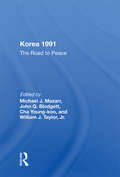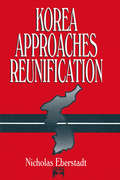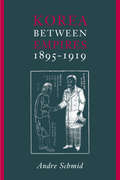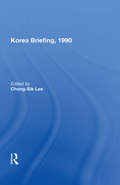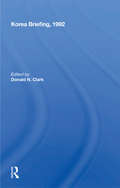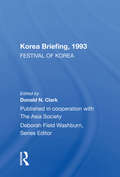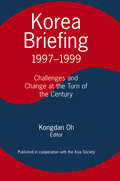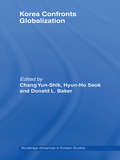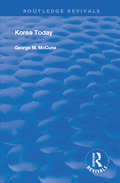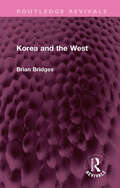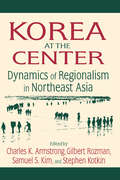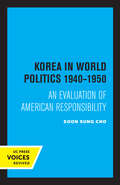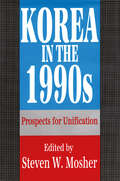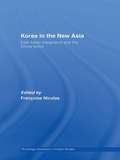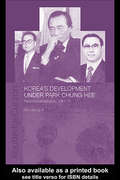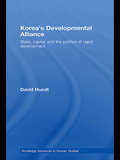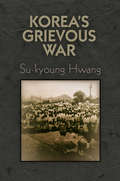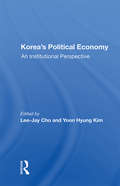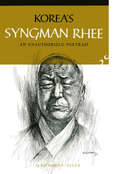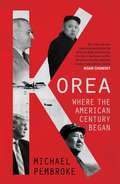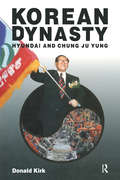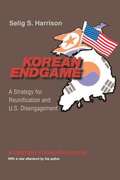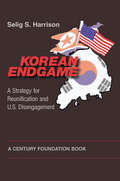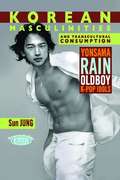- Table View
- List View
Korea 1905-1945: From Japanese Colonialism to Liberation and Independence (Imperialism in East Asia)
by Ku DaeyeolThis important new study by one of Korea’s leading historians focuses on the international relations of colonial Korea – from the Japanese rule of the peninsula and its foreign relations (1905–1945) to the ultimate liberation of the country at the end of the Second World War. In addition, it fills a significant gap – the ‘blank space’ – in Korean diplomatic history. Furthermore, it highlights several other fundamental aspects in the history of modern Korea, such as the historical perception of the policy-making process and the attitudes of both China and Britain which influenced US policy regarding Korea at the end of World War II.
Korea 1991: The Road To Peace
by William J. Taylor Michael J. Mazarr Cha Young-Koo John Q. BlodgettThis book is the product of a continuing joint effort by the Korea Institute for Defense Analyses and the Washington-based Center for Strategic and International Studies to find roads to a lasting settlement of the dangerous intra-Korean confrontation.
Korea Approaches Reunification
by Nicholas EberstadtThis work presents a detailed picture of the divergent socio-economic trends in divided Korea since its 1945 partition. It also covers the social and political situation in the North and South today, and the domestic and international challenges to a successful Korean reunification.
Korea Between Empires, 1895-1919
by Andre SchmidKorea Between Empires chronicles the development of a Korean national consciousness. It focuses on two critical periods in Korean history and asks how key concepts and symbols were created and integrated into political programs to create an original Korean understanding of national identity, the nation-state, and nationalism. Looking at the often-ignored questions of representation, narrative, and rhetoric in the construction of public sentiment, Andre Schmid traces the genealogies of cultural assumptions and linguistic turns evident in Korea's major newspapers during the social and political upheavals of the late nineteenth and early twentieth centuries.Newspapers were the primary location for the re-imagining of the nation, enabling readers to move away from the conceptual framework inherited from a Confucian and dynastic past toward a nationalist vision that was deeply rooted in global ideologies of capitalist modernity. As producers and disseminators of knowledge about the nation, newspapers mediated perceptions of Korea's precarious place amid Chinese and Japanese colonial ambitions and were vitally important to the rise of a nationalist movement in Korea.
Korea Briefing, 1990
by Chong-Sik LeeThis book initiates a series of comprehensive annual reviews of issues and events in the Republic of Korea and on the peninsula as a whole in 1990. It provides both students and specialist with a useful overview of a rapidly changing society.
Korea Briefing, 1992
by Donald N. Clark Deborah Field WashburnIn this third annual volume in the Korea Briefing series, experts analyze key aspects of contemporary Korean society. Included this year is an in-depth assessment of North Korea as well as chapters on politics, economics, women's issues, security on the Korean peninsula, and the development of the Korean press.
Korea Briefing, 1993: Festival Of Korea Edition
by Donald N. ClarkThis edition of Korea Briefing, the fourth in the series, is issued in conjunction with The Asia Society's Festival of Korea, a yearlong, nationwide celebration of Korean history, culture, and contemporary life.
Korea Briefing: 1997-1999: Challenges and Changes at the Turn of the Century (Asia Society Briefings Ser.)
by Kongdan Oh Ralph C. HassigWhile mainly focusing on the Kim Dae Jung era, the essays in this book examine persistent problems and new opportunities in Korean politics, economy, and culture. In 1997, Kim Ae Jung was elected to head the government of the Seventh Republic, after 30 years in opposition.
Korea Confronts Globalization (Routledge Advances in Korean Studies)
by Donald L. Baker Chang Yun-Shik Hyun-Ho SeokKorea Confronts Globalization looks at the way in which the phenomenon of globalization has impacted on Korean society in terms of national identity, corporate change, labour markets, democracy, tradition and social policy, and the implications for Korea's social cohesion in a continually globalizing world. While becoming more open to the outside world, South Korea has remained a cohesive national community with a strong nationalist reaction against the globalization of Korea and with Koreans constantly reminding themselves of the need to retain their national identity. They have also learned to cope with various forms of conflict arising from diversified interests in a complex society and the South Korean government is now making a serious attempt to establish a welfare state with various schemes designed to help the poor and needy to maintain a minimum level of ‘decent’ living. But it is uncertain whether South Korean society will continue to remain cohesive. Social inequality is increasing and the class divisions appear to be hardening and as such can Korea remain cohesive? As a volume looking at the political and social implications of globalization in modern South Korea, this book will be of great interest to students and scholars of Korean and East Asian studies, comparative sociology, development studies and politics
Korea Today (Routledge Revivals #3)
by George M. McCunePublished in 1950: Here is the first comprehensive study of Korea since its liberation and division. Written by an outstanding American authority with long personal knowledge of the country, it provides an analysis of the American and Russian military occupations, the efforts of the United Nations to deal with the problem of Unification of the country, the political and economic policies followed in the northern and southern regimes, and an appraisal of the U.S. program of economic and military aid to South Korea.
Korea and the West (Routledge Revivals)
by Brian BridgesFirst published in 1986, Korea and the West examines the political culture and the economic development of the two Koreas, as well as the state of the military balance on the peninsula. It looks at the interaction of the two Koreas with the outside world, particularly with the four major powers – China, Japan, the USSR and the USA. It considers in detail the extent and nature of West European interests, and the future role for the Europeans in developments on the Korean peninsula. This book will be of interest to students of political science, history, East Asian studies and international relations.
Korea at the Center: Dynamics of Regionalism in Northeast Asia
by Stephen Kotkin Gilbert Rozman Charles K. Armstrong Samuel S. KimThe common images of Korea view the peninsula as a long-standing battleground for outside powers and the Cold War's last divided state. But, Korea's location at the very center of Northeast Asia gives it a pivotal role in the economic integration of the region and the dynamic development of its more powerful neighbors. A great wave of economic expansion, driven first by the Japanese miracle and then by the ascent of China, has made South Korea - an economic powerhouse in its own right - the hub of the region once again, a natural corridor for railroads and energy pipelines linking Asiatic Russia to China and Japan. And, over the horizon, an opening of North Korea, with multilateral support, would add another major push toward regional integration. Illuminating the role of the Korean peninsula in three modern historical periods, the eminent international contributors to this volume offer a fresh and stimulating appraisal of Korea as the key to the coalescence of a broad, open Northeast Asian regionalism in the twenty-fifth century.
Korea in World Politics, 1940-1950: An Evaluation of American Responsibility
by Soon Sung ChoThis title is part of UC Press's Voices Revived program, which commemorates University of California Press’s mission to seek out and cultivate the brightest minds and give them voice, reach, and impact. Drawing on a backlist dating to 1893, Voices Revived makes high-quality, peer-reviewed scholarship accessible once again using print-on-demand technology. This title was originally published in 1967.
Korea in the 1990s: Prospects for Unification
by Steven W. MosherIn American history the 1950s are remembered as an affluent and harmonious decade. Not so in Austria. That nation emerged out of World War II with tremendous war-related destruction and with a four-power occupation that would last for ten years until 1955. Massive American economic aid enabled the Austrian economy to start recovering in the 1950s and reorient it from East to West. Unlike the United States, however, general affluence did not set in until the 1960s and 1970s even though Austria's dramatic baby boom enabled it to recover from the demographic catastrophe resulting from manpower losses of World War II., This volume deals with these larger trends. Stephen E. Ambrose discusses American-European relations and sets the larger international context for the Austrian scene. Oilver Rathkolb retraces the changing importance of the Austrian question for the Eisenhower administration. Michael Gehler presents an in-depth analysis of the intriguing question of whether Austria's unification at the price of permanent neutrality might have been a model for Germany. Franz Mathis and Kurt Tweraser look at economic reconstruction and the roles played by both the Austrian public industrial sector and the American Marshall Plan. Karin Schmidlechner looks at the youth culture of the era. Franz Adlgasser shows how Herbert Hoover's food aid was instrumental in the containment of communism in Hungary. Beth Noveck analyzes Austrian political culture of the First Republic from the perspective of Hugo Bettauer. Rolf Steininger presents an insightful historical overview of how the Austro-Italian South Tyrol conflict was resolved after seventy-five years of tension.
Korea in the New Asia: East Asian Integration and the China Factor (Routledge Advances in Korean Studies)
by Françoise NicolasSince the late 1970s a number of regional developments have impacted upon South Korea’s political and economic standing in Asia. China’s spectacular growth and closer integration with its neighbouring economies, along with a tendency toward more assertive political and diplomatic activity, have deeply altered both the economic and political East Asian environment. Simultaneously, the 1997-98 financial crisis catalysed a process of increased regional co-operation in East Asia. China’s rise has imposed a leadership problem that may constitute a major obstacle on the road to deeper regional integration, as well as add force to the need for collective action, and it is this paradox that may give South Korea a key role in the reorganization of the region. Moreover, inter-Korean relations and Korea’s future security environment may also feel the effects of the rise of China. Korea in the New Asia seeks to analyze to what extent and how South Korea may contribute to, and take advantage of, the new regional configuration in East Asia. The book represents the first study to address Korea’s regional policy responses to the rise of China as an economic power and the regional economic integration of East Asia. Written by an international team of experts, this multidisciplinary study will appeal to researchers, academics and students with an interest in international relations, security studies, economics and East Asian politics. .
Korea's Development Under Park Chung Hee: Rapid Industrialization, 1961-79 (Routledge/Asian Studies Association of Australia (ASAA) East Asian Series)
by Hyung-A KimBased on personal interviews with the principal policy-makers of the 1970s, Korea's Development under Park Chung-Hee examines how the president sought to develop South Korea into an independent, autonomous sovereign state both economically and militarily. Kim provides a new narrative in the complex task of exploring the paradoxical nature and effects of Korea's rapid development which maintains that any judgement of Park must consider his achievements in the socio-economic, cultural and political context in which they took place. Aspects of Park's government analyzed include:*his abhorrence of Korea's reliance on the US presence*the Korean model of state-guided industrialization*Park's rapid development strategy *the role of the ruling elites*Park's clandestine nuclear development program*the heavy chemical industrialisation of the 1970sThe prevailing popularity of Park in the eyes of the Korean public is significant and relevant to their acceptance of how their national development was achieved. This book tells that story while simultaneously recognizing the flaws in the process. With a great deal of material never before published, scholars of Korean politics and history at all levels will find this book a stimulating account of South Korea in the 1960s and 1970s.
Korea's Developmental Alliance: State, Capital and the Politics of Rapid Development (Routledge Advances in Korean Studies)
by David HundtSouth Korea is often cited as a case of miraculous transformation from poverty to prosperity. Korea’s achievement of moving from one of the world’s poorest countries as recently as the early 1960s to the ranks of the ten biggest economies only four decades later has rightly attracted interest from policymakers and scholars alike. This book identifies the factors that shaped relations between the state and big business in Korea, the ‘developmental alliance’. These factors offer a cogent framework in which to identify and predict changes in power relations between government and business. Rather than merely offering a means of explaining the rapid-growth phase of Korean development, the politics of the developmental alliance also help us understand how and why the Korean miracle turned to crisis in 1997 and why the subsequent recovery has been so uneven. In this way, the book highlights the political power of business, which is often underplayed in discussions of the development of Korea. It also sheds light on the constraints on policymakers during modernisation, and how power is shared among a small number of powerful parties. Illustrating the tumultuous politics of the ‘developmental alliance’ between business and government during the rise and decline of South Korea’s economic miracle, this book is an essential read for anyone interested in Korean politcs, economics and development,
Korea's Grievous War
by Su-Kyoung HwangIn 1948, two years before Cold War tensions resulted in the invasion of South Korea by North Korea that started the Korean War, the first major political confrontation between leftists and rightists occurred on the South Korean island of Cheju. Communist activists disrupted United Nations-sanctioned elections and military personnel were deployed to Cheju. What began as a counterinsurgency operation targeting 350 local rebels resulted in the deaths of around 30,000 uninvolved civilians, 10 percent of the island's population. <P><P>Su-kyoung Hwang's Korea's Grievous War recounts the civilian experience of anticommunist violence, beginning with the Cheju Uprising in 1948 and continuing through the Korean War until 1953. Wartime declarations of emergency by both the U.S. and Korean governments were issued to contain communism, but a major consequence of their actions was to contribute to the loss of over two million civilian lives. Hwang inventories the persecutions of left-leaning intellectuals under the South Korean regime of Syngman Rhee and the executions of political prisoners and innocent civilians to "prevent" their collaboration with North Korea. She highlights the role of the United States in observing, documenting, and yet failing to intervene in the massacres and of the U.S. Air Force's three-year firebombing of North and South Korea. <P><P>Hwang draws on archival research and personally conducted interviews to recount vividly the acts of anticommunist violence at the human level and illuminate the sufferings of civilian victims. Korea's Grievous War presents the historical background, political motivations, legal bases, and social consequences of anticommunist violence, tracing the enduring legacy of this destruction in the testimonies of survivors and bereaved families that only now can give voice to the lived experience of the grievous war and its aftermath.
Korea's Political Economy: An Institutional Perspective
by Lee-Jay Cho Yoon Hyung KimOver the past three decades, South Korea has moved along a path of strong economic growth and political democratization, attracting worldwide attention and providing valuable lessons for other developing economies. Yet Korea still must grapple with many intractable problems fueled by its rapid industrialization and uneven growth, including unbalanced distribution of wealth, concentrated economic power, and adversarial relationships between management and labor. Within the context of these sweeping changes, this volume explores options for economic and social institutional reform in Korea. Drawing on models of economic development from Japan, the United States, and Europe, a distinguished group of Asian and Western scholars relates the experiences of previously industrialized economies to each facet of Koreas economic system, including national management; taxation and banking; land ownership and use; trade and industrial strategy; and relations among business ownership, management, and labor. In so doing, the contributors provide valuable insights and fresh proposals for a viable model of social and economic modernization. Throughout the volume, the contributors emphasize the importance of Koreas cultural heritage-not only in explaining the nations recent growth but also as a key element of its continued success. By providing an overview of the evolution and interaction of Korean economic, political, and sociocultural institutions, the contributors make clear how these structures mediate the movement between cultural values and economic progress.
Korea's Syngman Rhee: An Unauthorized Portrait
by Richard C. Allen"It is always saddening when a patriot is corrupted by the power that comes to him as a gift from his people after a lifetime of service to his country," observes the author of this unofficial and exceptionally honest portrait of South Korea's recently deposed chief executive, Syngman Rhee, the man whose career spanned the decades between the late-nineteenth-century period of China's suzerainty in Korea and the revolt of April 1960, reached a peak of popularity following his country's liberation at the end of World War II, yet twelve years later was thrown out of office by revolution. During his lifetime, he has become almost a legend in both East and West and, in much of the world, is considered the virtual embodiment of the Korean struggle for independence. "The story of South Korea," the author further observes, "is indeed the story of its erstwhile president, even as the fall of his government can be traced directly to the personal shortcomings of the head of state."Rhee, who has for more than half a century been a controversial figure on the stage of East-West relations Western champions and his compatriot propagandists.
Korea: Where The American Century Began
by Michael PembrokeUnless you know the history, you cannot see the future. In late 1950, the US-led invasion of North Korea failed and for the next three years the United States bombed the North&’s cities, towns and villages relentlessly. Pyongyang has been determined to develop a credible nuclear deterrent ever since. The Korean War was the first of America&’s unsuccessful military interventions post-World War II and its first modern conflict with China. It established the pattern for the next sixty years and marked the true beginning of the American century. With compassion for the people of the North and South, and understanding for the soldiers caught between the bitter winter and an implacable enemy, Michael Pembroke tells the absorbing story of Korea. It is essential reading for anyone seeking to understand why the Korean peninsula has become the nuclear flashpoint it is today.
Korean Dynasty: Hyundai and Chung Ju Yung
by Donald KirkThis study focuses on a single Korean "chaebol", the business conglomerate which dominates the Korean economy. Hyundai, the largest chaebol, is examined in the context of Korean history, ancient and modern, and the Confucian value system that permeates all Korean life.
Korean Endgame: A Strategy for Reunification and U. S. Disengagement
by Selig S. HarrisonNearly half a century after the fighting stopped, the 1953 Armistice has yet to be replaced with a peace treaty formally ending the Korean War. While Russia and China withdrew the last of their forces in 1958, the United States maintains 37,000 troops in South Korea and is pledged to defend it with nuclear weapons. In Korean Endgame, Selig Harrison mounts the first authoritative challenge to this long-standing U.S. policy. Harrison shows why North Korea is not--as many policymakers expect--about to collapse. And he explains why existing U.S. policies hamper North-South reconciliation and reunification. Assessing North Korean capabilities and the motivations that have led to its forward deployments, he spells out the arms control concessions by North Korea, South Korea, and the United States necessary to ease the dangers of confrontation, centering on reciprocal U.S. force redeployments and U.S. withdrawals in return for North Korean pullbacks from the thirty-eighth parallel. Similarly, he proposes specific trade-offs to forestall the North's development of nuclear weapons and missile delivery systems, calling for the withdrawal of the U.S. nuclear umbrella in conjunction with agreements to denuclearize Korea embracing China, Russia, and Japan. The long-term goal of U.S. policy, he argues, should be the full disengagement of U.S. combat forces from Korea as part of regional agreements insulating the peninsula from all foreign conventional and nuclear forces. A veteran journalist with decades of extensive firsthand knowledge of North Korea and long-standing contacts with leaders in Washington, Seoul, and Pyongyang, Harrison is perfectly placed to make these arguments. Throughout, he supports his analysis with revealing accounts of conversations with North Korean, South Korean, and U.S. leaders over thirty-five years. Combining probing scholarship with a seasoned reporter's on-the-ground experience and insights, he has given us the definitive book on U.S. policy in Korea--past, present, and future.
Korean Endgame: A Strategy for Reunification and U.S. Disengagement
by Selig S. HarrisonNearly half a century after the fighting stopped, the 1953 Armistice has yet to be replaced with a peace treaty formally ending the Korean War. While Russia and China withdrew the last of their forces in 1958, the United States maintains 37,000 troops in South Korea and is pledged to defend it with nuclear weapons. In Korean Endgame, Selig Harrison mounts the first authoritative challenge to this long-standing U.S. policy. Harrison shows why North Korea is not--as many policymakers expect--about to collapse. And he explains why existing U.S. policies hamper North-South reconciliation and reunification. Assessing North Korean capabilities and the motivations that have led to its forward deployments, he spells out the arms control concessions by North Korea, South Korea, and the United States necessary to ease the dangers of confrontation, centering on reciprocal U.S. force redeployments and U.S. withdrawals in return for North Korean pullbacks from the thirty-eighth parallel. Similarly, he proposes specific trade-offs to forestall the North's development of nuclear weapons and missile delivery systems, calling for the withdrawal of the U.S. nuclear umbrella in conjunction with agreements to denuclearize Korea embracing China, Russia, and Japan. The long-term goal of U.S. policy, he argues, should be the full disengagement of U.S. combat forces from Korea as part of regional agreements insulating the peninsula from all foreign conventional and nuclear forces. A veteran journalist with decades of extensive firsthand knowledge of North Korea and long-standing contacts with leaders in Washington, Seoul, and Pyongyang, Harrison is perfectly placed to make these arguments. Throughout, he supports his analysis with revealing accounts of conversations with North Korean, South Korean, and U.S. leaders over thirty-five years. Combining probing scholarship with a seasoned reporter's on-the-ground experience and insights, he has given us the definitive book on U.S. policy in Korea--past, present, and future.
Korean Masculinities and Transcultural Consumption
by Sun JungSouth Korean masculinities have enjoyed dramatically greater influence in recent years in many realms of pan-Asian popular culture, which travels freely in part because of its hybrid trans-nationalistic appeal. This book investigates transcultural consumption of three iconic figures - the middle-aged Japanese female fandom of actor Bae Yong-Joon, the Western online cult fandom of the thriller film 'Oldboy,' and the Singaporean fandom of the pop-star Rain. Through these three specific but hybrid contexts, the author develops the concepts of soft masculinity, as well as global and postmodern variants of masculine cultural impacts. In the concluding chapter, the author also discusses recently emerging versatile masculinity within the transcultural pop production paradigm represented by K-pop idol boy bands.

